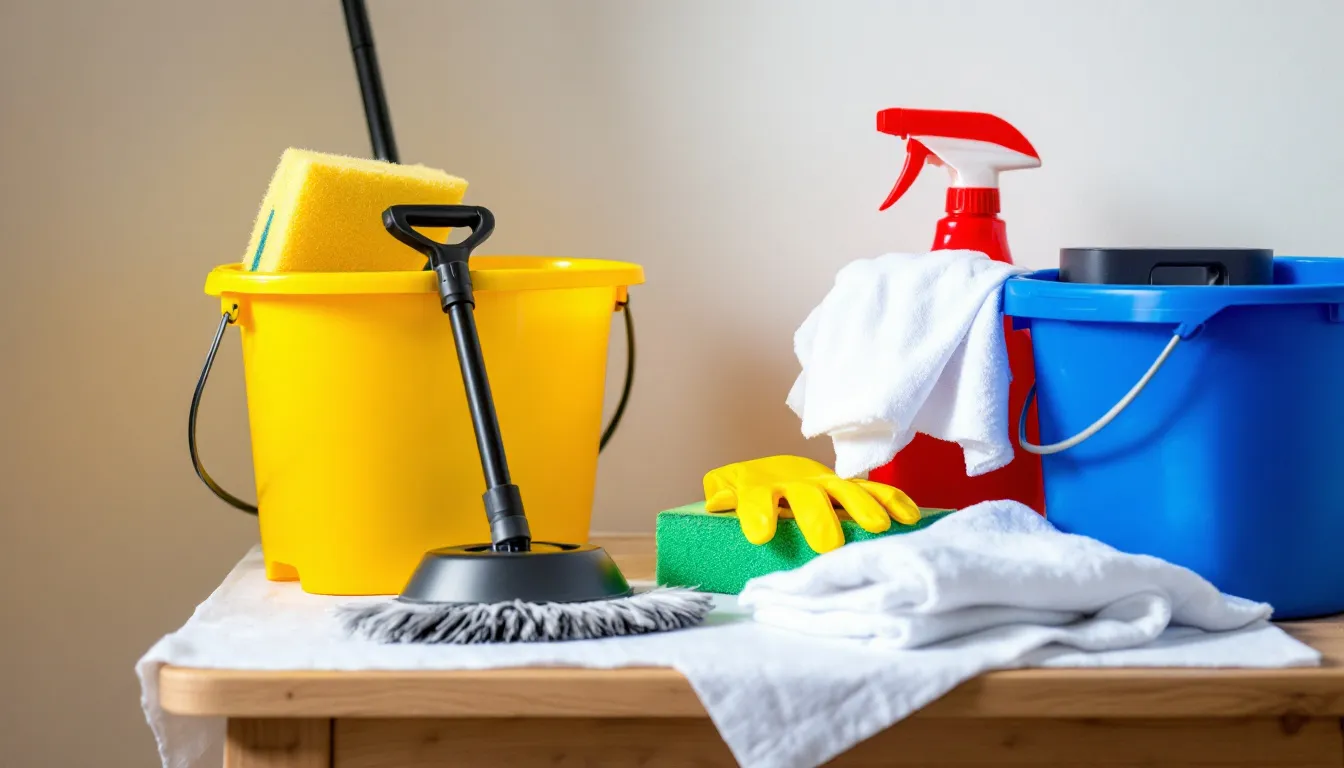Starting a cleaning business in Maine offers excellent opportunities for entrepreneurs looking to build a profitable service business in the Pine Tree State. Maine’s growing residential and commercial markets, combined with straightforward business registration requirements and supportive local government programs, make it an ideal location for launching your cleaning venture. This comprehensive guide covers all essential steps from business registration to obtaining proper licenses and insurance coverage.
The cleaning industry continues to experience robust growth, with the U.S. market valued at over $78 billion in 2023. Maine’s unique combination of tourism demand, aging population demographics, and business-friendly policies creates an especially favorable environment for new cleaning businesses. Whether you’re considering residential house cleaning services or commercial office cleaning, understanding Maine’s specific requirements will help you operate legally and build a successful business from day one.

Essential Steps
Successfully launching your cleaning business in Maine requires careful attention to legal compliance and proper business setup. These foundational steps will ensure you can operate legally while protecting both your business and your clients.
Choose Your Business Structure
Deciding on your business structure is one of the most important decisions you’ll make when starting your cleaning company. In Maine, you have several options, each with different implications for liability protection, taxes, and operational complexity.
A sole proprietorship is the simplest structure, requiring minimal paperwork and allowing you to operate under your own name. However, this structure offers no liability protection, meaning your personal assets could be at risk if your business faces legal issues or property damage claims.
A limited liability company (LLC) provides strong liability protection while maintaining operational flexibility. Most cleaning businesses in Maine choose this structure because it separates personal and business assets, protecting your home and savings from potential business-related lawsuits. To form an LLC, you must file Articles of Organization with the Maine Secretary of State and pay the required filing fee.
Corporations offer the strongest liability protection but involve more complex tax requirements and administrative burden. This structure is typically chosen by larger cleaning companies planning to hire employees or seek significant investment funding.
Register Your Business Name
If you plan to operate under any name other than your full legal name, you must register a DBA name (Doing Business As) with your local city or town clerk’s office. This requirement applies whether you’re operating as a sole proprietor using a business name like “Pine State Cleaning Services” or if your LLC name differs from your marketing name.
The DBA registration process varies slightly between municipalities, but generally requires completing a simple form and paying a modest fee, typically ranging from $25 to $100. Some towns may require publication of your business name in a local newspaper, while others simply file the paperwork with the town clerk.
Obtain Your Employer Identification Number
An EIN from the IRS serves as your business’s federal tax identification number. Even if you don’t plan to hire employees immediately, obtaining an EIN is essential for opening business banking accounts, applying for business licenses, and establishing business credit.
You can apply for an EIN online through the IRS website free of charge. The process typically takes just a few minutes, and you’ll receive your number immediately upon approval. This nine-digit number will be required for virtually all business-related financial and tax matters.
Secure Required Business Licenses
Business licensing requirements vary significantly between Maine’s cities and towns. Most municipalities require a general business license for cleaning services, but specific requirements, fees, and renewal periods differ by location.
Contact your local city or town clerk’s office to determine the exact business licenses you need. Some communities may require additional permits for commercial cleaning operations, especially if you plan to work in healthcare facilities or handle specialized cleaning chemicals. The application process typically involves completing forms, paying fees, and sometimes providing proof of insurance coverage.
Obtain Insurance and Bonding
General liability insurance is essential for any cleaning business, protecting you from claims related to property damage, accidents, or injuries that occur during cleaning services. Most policies range from $500,000 to $2,000,000 in coverage limits, with annual premiums typically costing between $500 and $2,000 depending on your coverage needs and business size.
Bonding provides additional protection for your clients against theft or failure to complete contracted work. While not legally required in Maine, many commercial clients and some residential customers expect cleaning companies to be bonded. Surety bonds can typically be obtained through the same insurance companies that provide your general liability coverage.
Workers’ compensation insurance becomes mandatory once you hire employees. This coverage protects both you and your workers by covering medical expenses and lost wages for work related injuries that occur on the job.

Research Local Permit Requirements
Beyond basic business licenses, some cleaning operations may require additional permits, particularly for commercial work. If you plan to provide services to restaurants, healthcare facilities, or handle hazardous materials, check with your local city government about special permits or certifications.
Environmental regulations may also apply if you’re disposing of certain cleaning chemicals or working with specialized equipment. The Maine Department of Environmental Protection can provide guidance on any environmental compliance requirements that might affect your cleaning business.
Register for State Taxes
One significant advantage of operating a cleaning business in Maine is that residential cleaning services are exempt from sales taxes. However, if you plan to offer commercial cleaning services or sell cleaning supplies, you may need to register with Maine Revenue Services and obtain a sales tax permit.
Even without sales tax obligations, you’ll need to file annual business tax returns and make estimated tax payments quarterly if your business generates significant income. Consulting with a tax professional familiar with Maine business requirements can help ensure proper compliance from the start.
Establish Business Banking and Bookkeeping
Separating your personal and business finances is crucial for legal protection and tax compliance. Open dedicated business banking accounts using your EIN and maintain detailed records of all business income and expenses.
Proper bookkeeping becomes essential when you hire employees, as you’ll need to track payroll taxes, workers’ compensation premiums, and other employment-related expenses. Many cleaning business owners use simple accounting software or work with local bookkeeping services to maintain accurate financial records.
Why Maine is Ideal for Cleaning Businesses
Maine’s unique economic and demographic characteristics create exceptional opportunities for cleaning service providers. The state’s combination of seasonal tourism, growing commercial districts, and changing population demographics generates consistent demand across both residential and commercial cleaning markets.
Tourism Industry Impact
Maine’s robust tourism sector drives significant demand for cleaning services throughout the state. The tourism industry generates over $6 billion annually, supporting hotels, restaurants, vacation rentals, and entertainment venues that all require professional cleaning services. Seasonal properties and short-term rentals create particularly strong demand for turnover cleaning services between guests.
Coastal communities from Kennebunkport to Bar Harbor experience peak cleaning demand during summer months, while inland areas benefit from year-round tourism related to outdoor recreation and business travel. This seasonal variation allows cleaning businesses to adjust their services and pricing to maximize revenue during high-demand periods.
Demographic Advantages
Maine’s aging population creates sustained demand for residential cleaning services. With one of the oldest median ages in the nation, many Maine residents increasingly value the convenience and necessity of professional house cleaning services. This demographic trend suggests continued growth in residential cleaning demand over the coming decades.
The state’s growing professional population, particularly in areas like Portland’s financial district and technology sectors, also drives demand for both residential and commercial cleaning services. Dual-income households frequently outsource cleaning tasks, creating a stable customer base for residential cleaning companies.
Competitive Landscape
Compared to major metropolitan areas in neighboring states like New Hampshire or Massachusetts, Maine offers relatively less saturated cleaning service markets. This lower competition allows new cleaning businesses to establish themselves more easily and build loyal customer bases without facing intense price competition from numerous established competitors.
Rural and smaller communities throughout Maine often have limited cleaning service options, creating opportunities for new businesses to serve underserved markets. Even in larger cities like Portland and Bangor, the cleaning industry remains fragmented enough to allow new entrants to find profitable niches such as emerging business models in the cleaning industry.

Maine-Specific Advantages
Maine’s business environment offers unique benefits that make it particularly attractive for cleaning business entrepreneurs. The state’s supportive programs, tax structure, and regulatory approach create advantages not found in many other locations.
State Support Programs
Maine’s Business Answers Program provides free, personalized guidance to help new businesses navigate licensing requirements and regulatory compliance. This service, offered through the Department of Economic & Community Development, assigns dedicated counselors who can identify all necessary permits and licenses for your specific cleaning business model.
The MaineBusinessWorks program offers ongoing business development assistance and access to financing programs specifically designed for small businesses. These resources include loan guarantee programs, business planning assistance, and connections to local economic development organizations that can provide additional support and networking opportunities.
Maine’s SCORE mentorship program connects new business owners with experienced entrepreneurs who can provide guidance on everything from business plan development to marketing strategies. This volunteer mentoring service is particularly valuable for first-time business owners entering the cleaning industry.
Tax and Regulatory Benefits
Maine’s exemption of residential cleaning services from sales tax simplifies operations significantly compared to states where cleaning businesses must collect and remit sales taxes on residential work. This exemption reduces administrative burden and eliminates the need for complex tax collection systems for residential-focused cleaning companies.
The state’s relatively straightforward business registration process, combined with helpful state resources, makes it easier to navigate startup requirements compared to more complex regulatory environments in other states. Local governments generally maintain business-friendly approaches that support small business development.
Community Focus and Local Business Support
Maine communities typically demonstrate strong support for local businesses, creating opportunities to build deep customer relationships and benefit from word-of-mouth referrals. This community-oriented culture often translates into customer loyalty and opportunities to secure funding from local banks and credit unions that prioritize supporting local entrepreneurs.
Municipal economic development programs in cities like Portland, Lewiston, and Bangor often include resources specifically designed to help service businesses succeed. These may include discounted business development services, networking events, and promotional opportunities through local business associations.
The state’s focus on environmental sustainability also creates opportunities for cleaning businesses that emphasize eco-friendly practices and green cleaning products. Maine customers often show strong preference for environmentally responsible service providers, allowing cleaning companies to differentiate themselves through sustainable business practices.
Key Resources for Maine Cleaning Businesses
Successfully navigating the startup process requires knowing where to find reliable information and support. These Maine-specific resources provide essential guidance for cleaning business owners at every stage of development.
State Government Resources
The Maine Business Answers Program serves as your primary contact for licensing guidance and permit identification. Their counselors can review your specific business model and provide a comprehensive list of all required licenses and permits. Contact them at (800) 872-3838 or visit their website for personalized assistance.
Maine Secretary of State Bureau of Corporations handles business entity registration for LLCs and corporations. Their office provides detailed guidance on filing requirements, fees, and ongoing compliance obligations. You can access forms and filing information online or contact their office directly for assistance with complex registration questions.
Maine Revenue Services at (207) 626-8475 provides guidance on tax-related questions and estimated tax payments. Even though residential cleaning services are exempt from sales tax, business income taxes and employment taxes still apply once you begin generating revenue or hire employees.
Local Government Contacts
Your local city or town clerk’s office handles DBA registration and business licensing requirements specific to your municipality. Since requirements vary significantly between communities, direct contact with your local clerk’s office ensures you obtain accurate, up-to-date information about local permits and licensing fees.
Many municipalities also offer small business development programs or can connect you with local economic development organizations that provide additional resources and support services.
Ongoing Business Development Support
The MaineBusinessWorks program provides access to business development assistance and financing programs that extend well beyond the startup phase. Their services include help with business plan development, financial planning, and connections to lending sources that understand the cleaning industry.
Local SCORE chapters throughout Maine offer ongoing mentorship and business development workshops specifically designed for service businesses. These volunteer mentors bring decades of business experience and can provide valuable guidance on operational challenges, marketing strategies, and growth planning.
Maine Small Business Development Centers, located at various colleges and universities throughout the state, provide free business counseling and low-cost training programs. These centers often offer workshops on topics particularly relevant to cleaning businesses, such as pricing strategies, customer retention, and employee management.
Industry-Specific Resources
The Building Service Contractors Association International (BSCAI) provides industry-specific training, certification programs, and networking opportunities for cleaning business owners. While not Maine-specific, this organization offers valuable resources for understanding industry best practices and connecting with other cleaning business professionals.
Local supplier networks and equipment dealers can provide valuable ongoing support for purchasing equipment, finding reliable cleaning supplies, and staying updated on new products and techniques. Building relationships with local suppliers often leads to better pricing, flexible payment terms, and valuable business advice from experienced industry professionals.

Starting a cleaning business in Maine combines the benefits of a supportive state business environment with strong market demand across both residential and commercial sectors. The state’s straightforward registration requirements, helpful government programs, and business-friendly policies create an ideal foundation for building a successful cleaning company.
Maine’s unique advantages—from tourism-driven demand to demographic trends favoring cleaning services—position new cleaning businesses for sustained growth and profitability. By following the essential steps outlined in this guide and taking advantage of Maine’s excellent business support resources, you can establish a legally compliant, professionally operated cleaning business that serves your community while building long-term financial success.
Take the first step today by contacting the Maine Business Answers Program to discuss your specific business plans and begin the registration process. With proper planning, legal compliance, and dedication to excellent customer service, your Maine cleaning business can thrive in this welcoming and supportive business environment.